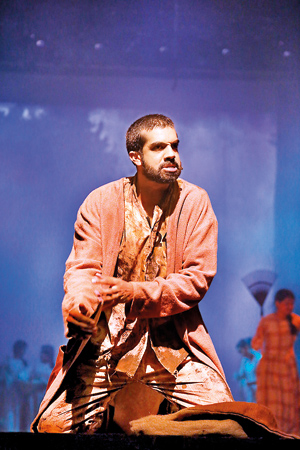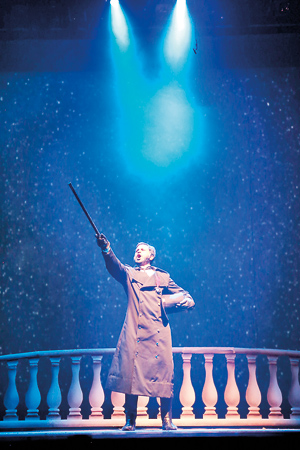Professionalism was the star, at the end of the day
I was at my wit’s end just the other afternoon when the Actress had an idea to blow the cobwebs away. “Bishop,” she warbled, “Let’s go for a Les Mis matinée!”
Being in a sunny frame of mind, I acquiesced. And later wondered whether it would end in tears? Because many of our outings to amateurish local musicals leave something to desired! But this time it was going to be different: I could feel it in my clerical collar ever since I read Smriti Daniel’s professionally written review.
Don’t worry, dears. This isn’t going to be difficult for you – or for yours truly. You saw the production. And were no doubt gobsmacked by it. Now sit back, relax, and enjoy the show… as the Actress said to the Bishop.
The play
Les Misérables – popularly Les Mis – is a long-running, world-famous, musical based on the eponymous story by French novelist Victor Hugo. The book makes lovely, dark, and deep reading.
The musical is composed by Claude-Michel Schönberg, with French lyrics by Alain Boublil and Jean-Marc Natel, and a corresponding English libretto by Herbert Kretzmer.
Set with its action starting off on the Toulon galley 200 years ago and working up to the sociopolitical revolution of 1832, it is the story of a Frenchman who makes a personal journey, from ravenousness and robbery as a perceived ‘criminal’ to redemption and recognition as a ‘popular’ citizen.
En route, the peasant who becomes a prince encounters a potpourri of characters – most notably a relentless and remorseless police inspector on the hunt… And he and his nemesis and a goulash of others “are swept into a revolutionary period in France, where a group of young idealists make their last stand at a street barricade”.
“Did you get that last bit from the Internet, Bishop?” The Actress accused me of plagiarism. “If it’s in quotes, I’m not courting disaster, dear,” I played her back on words.
The players
We had seen Jehan (who played the part in 1997) as Jean Valjean, so to see Rehan Almeida interpret it was a treat. Where Jehan was flamboyant but controlled, Rehan was restrained but quietly powerful.
Playing the protagonist who undergoes a transformation from a hunted criminal to a compassionate humanitarian, Almeida turned in a suitably underplayed performance that showcased his own talent without overshadowing the skills of others.
A broodingly menacing foil was supplied by Javert’s character, a legalist law-enforcer who sees the human emotions and enterprises of his time in shades of black and white.
Mario de Soyza thrilled the audience with his deep register of interpretation and terrorized his co-players with his dark looks and a black mood sostenuto.
Together, these players provided a nice, tense, contrapuntal movement around which the plot revolved.

Powerful performances: Rehan Almeida as Valjean and Mario de Soyza as Javert. Pix by Shehal Joseph
The plot through a prism
It is Everyman Agonist meets Existential Angst and finds Eternal Actualization. “Keep it simple, Bishop,” whispers the Actress from the sidelines. Oh, ok, dear… Or, as the French have it: “Mais oui.”
All credit to Victor Hugo for crafting such a deeply insightful and moving novel of human suffering and a striving to rise above it by hook or by crook, through happenstance or circumstance, or through courage and conviction.
Also kudos to Boublil, Kretzmer, et al., who have culled the essence of the profound original and distilled it for wider audiences through the more populist crucible of a sung-through musical.
The players again
We went hoping to hear Melanie Bibile’s haunting mezzo-melancholy move us to tears, but got another Fantine instead. We went hoping to see the diminutive Amandhi Caldera do major things in the role of Eponine, but saw someone else in her place that penultimate afternoon.
But personal disappointment aside (we didn’t check the published schedule beforehand), the professional demeanour of those two (perhaps lesser known players) proved that It Is The Play That’s The Thing, not simply always the player, who makes a production memorable.
The clear and consummate professionalism of ALL the players AND the production team was the key to a sustainably good run for WSP – and for what it is worth, we felt that the company had mastered the art of making this show (11 nights, 4 matinées) doable and delightful each night, every night.
No grandstanding, no one-upmanship, but the sheer grind of entertaining the audience – not merely the actors or their aficionados alone!
The performers
With that said, there will be a few outstanding performances that will have audiences chuckling all the way from introit to intermission, and it will also have our wily impresarios laughing all the way to the bank.
At the end of the evening on which we ‘wendt’, it was Reihan Stephen and Kumudini David as the Thénardiers who kept us smiling from their peculiar first appearance to their perverse last curtain.
Surely, Smriti Daniel is right, in that it is this duo – “vile and vulgar”, “evil but entertaining” – who make Les Mis (as it is known: a heavy play with many grim and gritty realities to grit one’s teeth through) not so misérable after all!
Anoj Wijayaratne and his streetfighting gang added brio and panache to the thrust of the musical, with the thrumming of Do You Hear plucking audiences’ heartstrings as the action at the barricades mounted to a climax.
Dino Corera, in gentle contrast, added to the overall lightness of theme that lifted Les Mis out of its own swamps of misery into being a socially relevant musical and a significant message to contemporaneity.
The pertinence
“Really, Bishop, isn’t that pushing it a bit too far?”
“Musicals also have a message, dear…”
“Which is what? That human nature hasn’t changed in 200 years, since 1815?”
“That’s Toulon! Or not long enough? Say 2,000 years…”
“That’s what this three-hour show is all about? Plus a change, plus c’est la même chose?”
“That… and this… that ‘to love another person is to see the face of God’.”
“You used to be a harder man, Bishop!”
“Yes, dear; but like Valjean, I’ve let the Bishop’s act of mercy soften me.”
“Don’t go all soft on me, Bishop!”
The purpose
But seriously, folks! There is some merit in the mounting of musicals of this tenor – if the tone of the whole show and the timbre of its showing make it more than simply a fortnight of fun and frolic for a few talented folks and their friends and family.
Hope that more amateur theatre companies dial it down a notch with a penchant for Over The Top productions which cost a pretty penny and a proclivity for “standing ‘O’s” which cost nothing and are often worth little.
The production
Well-structured, well-oiled. Professional, passionate, pleasing, in equal parts.
The production values
Slick. Sleek. Smooth. (Notwithstanding the myriad hitches we heard about and the glitches it was our good fortune not to be subjected to!)
“I think we need to give the technical crew and backstage boys an appreciative hand,” sighed the Actress admiringly.
“That lighting and those special effects were stunning,” I admitted offhandedly.
We especially liked the stabbing beams of light as deadly bolts of grapeshot.
The props
Stunning. Sets that had grasped the big picture of West End’s longest running (the world’s second-longest running) musical, but which had not stinted on paying attention to the details of making a small stage work well with so much less of the usual amenities (no revolving stage here, for e.g.). Set changes that were quick and well-executed.
The pluses
In keeping with Broadway and West End trends, this local outing of Les Mis – a first for Asian amateur productions, courtesy the copyright-owners – adopted and adapted some key technologies that took the production to a different level: moveable sets and ‘video mapping’ for scene-setting.
The peripherals
In productions of this scale, some sterling players in the overall effort remain invisible. These stalwarts take care of cast/crew, costuming, set design and construction, logistics, light and sound, stage management, choral training/choreography, sale of tickets/souvenirs, promotions/publicity, photography/videography, financing, front of house/backstage, legal/copyright, and other vital aspects of the whole show.
WSP has turned this meticulous planning into a professional machine. Take a bow, production team!
The paterfamilias
A production of this magnitude has to be mastered by a field marshal.
There he was: the old ‘Phantom’ himself, front of house; a possible plethora of concerns set aside momentarily, urging lolling-about thespians to “Go! Get good seats!” ELT in SL has much to thank Jerome L. de Silva for…
The pert young ’uns
A panoply of new talent, securing the next generation of WSP and introducing fresh blood into the mainstream of amateur English theatre in Sri Lanka. T
heir pipes and their stage presence! A good sign of the shape of things to come…
The playing-along
Excellent blocking. Scintillating movement. Choreography that was à tempo and allegro all the time – no mean feet, er, feat.
The professional approach
The so-called ‘stars’ didn’t come out on the night we went. Other audiences had no doubt much to say about Shanuki de Alwis and Sean Amarasekera as the Thénardiers and a stellar host of bit-part players.
That said, we didn’t miss them too much. If nothing else, the balance of professionalism and absence of showmanship worked in their absence – it speaks volumes about how much we think WSP has matured.
The parting
“Have WE matured?”
“We HAVE mellowed!”
“Shall we come again?”
“Let us, my dear!”
By all means: The play’s the thing, not necessarily the performers! Hope the Workshop Players’ professionalism will prevail over all the hoopla and hype…


